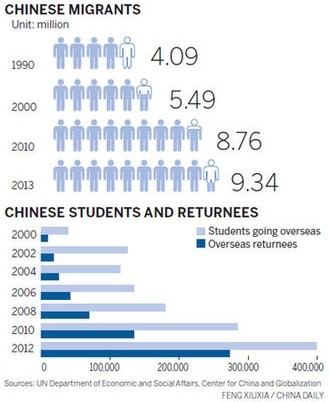

Children's educational prospects are now one of the main reasons Chinese citizens are thinking about moving overseas, recent data show.
Since 2008, the number of Chinese students in foreign countries has risen by about 20 percent a year.
In 2012, that figure was close to 400,000, according to the Annual Report on Chinese International Migration 2014 released by the Beijing-based Center for China and Globalization and the Chinese Academy of Social Sciences.
That increase also has provided a boost to migration agencies in China.
The number of clients seeking emigration has grown by 30 percent in 2013 year-on-year, said Zhao Hua, a manager at Aoji Star International Education Consultant Ltd, a private migration agency based in Beijing.
According to Zhao, there are generally three reasons Chinese citizens seek to emigrate: a cleaner environment and better food safety; educational prospects for their children; and a fully developed welfare system .
But she added that it's hard to say what drives the current emigration momentum.
"A trend in our business now is that the percentage of clients aged below 40 is increasing," said Zhao, adding that people between 30 and 40 years old comprised 30 percent of their clients last year, which constitutes a significant rise in this younger demographic.
According to Wang Lu, a staffer in the marketing department of Aoji Star International, "a large number of our clients listed their children's education as a primary reason for deciding to emigrate."
New Fortune magazine also said that in a recent survey, 76.7 percent of Chinese respondents gave their children's education as the reason they sought to emigrate.
In discussing why studying abroad with permanent residency is better than just being an international student, Zhao said that first and foremost, it means much lower tuition.
"The tuition for an international student is about three times that of a local one," she said.
"The children of most of our clients seeking to emigrate are in middle or high school, while some are even in primary school," Zhao said. "If you choose to emigrate before your children enter college overseas, you can save a lot of money, as the cost of immigration is less than tuition fees for an international student."
In addition, immigrants are often entitled to social welfare and health insurance just as local students are.
According to the 2014 report on Chinese international migration, immigrant students also have more job-hunting options, as they can choose to work in the country to which they migrated or in other countries.
Moreover, it is generally easier for them to get a job in the country where they study, as employers tend to prefer employees with permanent residency.
Bella Zhang, who went to Australia for a master's program in 2006, decided to try to immigrate after spending half a semester there.
"I decided to do this because I thought it was the right thing for me to do ," she said, although it did present a dilemma, as her parents were still living in China.
Zhang obtained permanent residency in Australia at the end of 2009.
After graduation, she found a job in Australia, and she worked there until mid-2011.
Ultimately, however, she decided to return to China and now works in Beijing.
"I returned primarily to be with my family," she said.
As an only child, Zhang said that she was constantly thinking about her parents when she lived in Australia.
Her parents, though, are still living in her hometown in Guizhou province,
while she works in Beijing.
Asked whether she would choose to go back with her parents to Australia, she said she couldn't say.
Armed with the immigration experience, Zhang said she hopes people considering doing so will take a deep breath before diving in.
"Immigration is what everyone could strive to do, but life after immigration is not perfect, as disadvantages as well as advantages still exist," she said.
The good thing about Australia, she said "is that young people don't have to worry about having to work extra hours in order to get a promotion, plus there the environment is clean and the food is safe.
"Something I didn't like was there weren't many entertainment options where I lived," she added.
Copyright ©1999-2018
Chinanews.com. All rights reserved.
Reproduction in whole or in part without permission is prohibited.